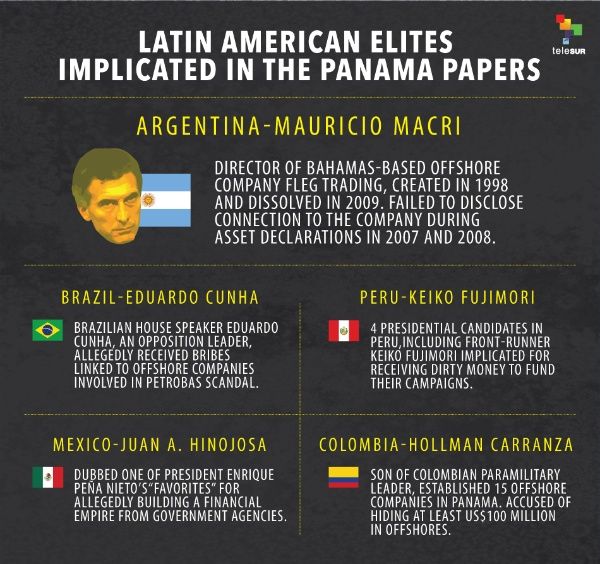The conflicts that President Mauricio Macri had to face during the last month were so big that it was impossible for them to go unnoticed, even for the corporate media which usually backs his every move.
IN DEPTH:
The Panama Papers
Besides the increasing workers’ mobilizations that took place week after week - four national strikes and a joint march by all of Argentina’s umbrella unions - April began for Macri with the dubious distinction of being the only Latin American president in office to appear in the Panama Papers, as a boardmember of two companies located in tax havens.
Since the case became public, the strategy of the Macri administration seemed clear: avoid talking about the issue and let it cool off. The only answer they were willing to give was that it is not illegal to found a company in a tax haven. Whether or not it was ethical for the President to use a mechanism which experts agree is aimed at evading taxes, facilitating money laundering or capital flight, seems to be a totally different matter that no member of the Macri administration was willing to adress.
RELATED:
More Dirty Money: Mauricio Macri Accepts Illegal Campaign Funds
But one month from the publishing date of the first stories related to the leak, Macri’s days of answering questions regarding the Panama Papers seem far from ending. Norman Darío Martinez, the same opposition congressman that filed legal charges against the president based on the leaks, decided to press new charges on Thursday. Martínez argues that while Macri said that the two companies were no longer active, public records say something very different.
In his legal complaint, to which teleSUR has access, Martínez says both of the companies that have Mauricio Macri as a boardmember remain active as of April 2016. Regarding one of the companies, Kagemusha SA, the congressman says that Macri does not mention it in his declarations of assets since 2006, which would mean that he hid such information during his two terms as Buenos Aires city Mayor (2007-2011 and 2011-2015).
About the second company, named Fleg Trading Inc., which was established in the Bahamas, President Macri said it had been founded by his father to make an investment in Brazil that had not been made after all. But Martinez argues the public records of Brazil say that company was registered in the country in 2002 and that it still remains active as of April 13, 2016. On the other hand, the information about the board of directors of the company in the Bahamas were deleted from the Open Corporate Register, which according to Martinez “makes us think that there is a deliberate action aimed at erasing the proof that are under investigation.”

Did Macri sell stocks of his own companies to himself?
A new case that Martínez brings out is the role of President Macri as a stockholder of Yacylec SA, an energy company based in Argentina. In his declaration of assets of 2015, Macri said he owns .01 percent of the company, but according to public records, in March 2016 he sold 5.3 percent of Yacylec’s stocks to a company named Sideco Americana SA. The move is intriguing not only because Macri would have sold a higher percentage of stocks that he declared to own, but also because both companies are owned by SOCMA SA, one of Argentina’s most important business holdings which belongs to the Macri family. Martínez says this would mean Macri “sold himself” such stocks resulting in a simulation, which would be a crime under Argentine legislation.
What’s in it for Martínez?
“What drove me to press these charges was that from the very first day that his involvement in the case became public, the head of the Anti Corruption Office, Laura Alonso, made it pretty clear she was not going to investigate the President,” Congressman Norman Martínez told teleSUR. Alonso, like other government officials, backed Macri by saying that what he did was not a crime.
Martínez explained he is not looking to harm the government itself, but to demand concrete policies to prevent Argentine wealth to be taken away to tax havens.
“The most important thing in this issue is to avoid these actions that facilitate capital flight, specially because on one hand they are rising the fares of public transportaiton and public services, there was a strong devaluation, but on the other hand, when big businesses carry out these actions, they turn their heads away," he said. "That’s why I asked the judiciary to ask the International Consortium of Investigative Journalists to provide the names of all Argentine companies and individuals involved in the scandal.”
“I know Macri, his family and even his government officials are part of the sectors that do this stuff. There are officials that used to be CEOs in banks that provided advisory services aimed at evading taxes. So I would love Macri to go against his own private interests and to move in favor of public interests, and to adopt measures to prevent these actions. Otherwise it is always the working people who pays for the money that others take away”, Martinez added.
It is yet to be seen if Martinez’s charges will be met by the local judiciary, which so far seems to be quite friendly with the Macri administration.